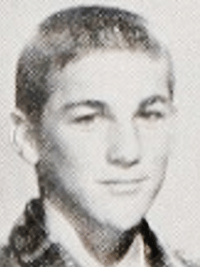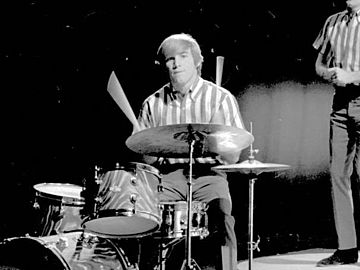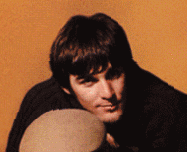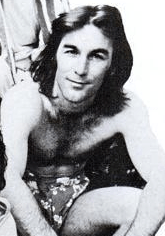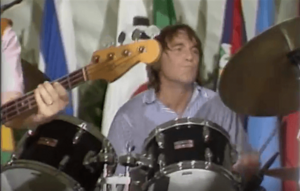Dennis Wilson facts for kids
Quick facts for kids
Dennis Wilson
|
|
|---|---|
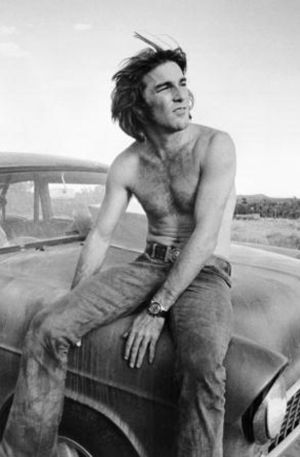
Wilson in a 1970 promotional shot for the film Two-Lane Blacktop
|
|
| Background information | |
| Birth name | Dennis Carl Wilson |
| Born | December 4, 1944 Inglewood, California, U.S. |
| Origin | Hawthorne, California, U.S. |
| Died | December 28, 1983 (aged 39) Marina del Rey, California, U.S. |
| Genres | |
| Occupation(s) |
|
| Instruments |
|
| Years active | 1961–1983 |
| Labels | |
Dennis Carl Wilson (born December 4, 1944 – died December 28, 1983) was an American musician, singer, and songwriter. He was one of the people who started The Beach Boys. He is best known as the band's drummer and was the middle brother of bandmates Brian and Carl Wilson. Dennis was the only real surfer in The Beach Boys. His life often showed the "California Myth" that the band's early songs sang about. He also appeared in the 1971 movie Two-Lane Blacktop.
Dennis mainly played drums and sang backing vocals for The Beach Boys. You can hear his drumming on many of the group's hit songs. He did not sing lead vocals much at first. But he became more important as a singer and songwriter after their 1968 album Friends. His own songs for the group included "Little Bird" (1968) and "Forever" (1970). Friends and writers have said he helped write "You Are So Beautiful". This was a hit song for Joe Cocker in 1974, and Dennis often sang it in his concerts.
His solo album, Pacific Ocean Blue (1977), got good reviews and sold a fair amount. He started working on a second solo album, Bambu, but it was not finished before he passed away. In 1983, Dennis drowned at age 39. In 1988, he was added to the Rock and Roll Hall of Fame as a member of The Beach Boys.
Contents
Growing Up in California
Dennis Carl Wilson was born on December 4, 1944. He was the second child of Audree Neva and Murry Gage Wilson. He grew up with his brothers Brian and Carl and their parents in Hawthorne, California. Dennis felt a bit different from his brothers. A friend from the neighborhood, David Marks, said that Dennis's lively behavior made other kids call him "Dennis the Menace."
Dennis had a lot of energy and was very active. He often did not want to join in family singalongs. He also avoided singing on the early recordings Brian made with a tape recorder. Dennis later said that Brian was very focused on music. He would "stay in his room all day listening to records." Dennis preferred playing outside or working on cars. However, Dennis would sing with his brothers late at night in their shared bedroom. Brian remembered one special song they sang called "Come Down, Come Down from the Ivory Tower." Brian said their late-night singing helped them develop a unique sound for The Beach Boys.
Dennis once said that if he had not gotten a BB gun when he was nine, his life would have been very different. He enjoyed outdoor activities like hunting, fishing, and racing. Brian told Melody Maker in 1966 that Dennis "had to keep moving all the time." Around age 14, Dennis started playing the piano and learned boogie-woogie styles.
Starting His Music Career
How The Beach Boys Began
The Wilson brothers' mother, Audree, insisted that Brian include Dennis in the first group of The Beach Boys. In 1960, Dennis started taking drum lessons at Hawthorne High School. His teacher, Fred Morgan, said Dennis was a "beater, not a drummer" but learned quickly when he wanted to. Brian said that the group formed because Dennis wanted it to. Dennis said he first planned to play bass guitar, but then chose drums because it seemed more exciting.
The Beach Boys officially started in late 1961. Murry, their father, became their manager. They had a local hit song called "Surfin'", which Brian wrote after Dennis asked him to. Dennis remembered being very excited. He ran down the street screaming, "Listen, we're on the radio!" The band became famous for California surfing culture, but Dennis was the only one in the band who actually surfed. Carl Wilson said, "Dennis was the only one who could really surf. We all tried, even Brian, but we were terrible. We just wanted to have a good time and play music."
In early 1963, Dennis worked with Brian's friend Gary Usher. They called themselves the Four Speeds and released a single. In March 1964, Dennis moved out of his family's home and into a place in Hollywood. In the notes for the band's 1964 album All Summer Long, Dennis wrote about living a fast life and loving it. In December, Murry told a reporter that Dennis spent money very freely. He spent a lot on a home, but the rest "just went."
In January 1965, Brian told his bandmates he would no longer tour with the group for a while.
More Singing and Songwriting
Brian felt that Dennis "never really had a chance to sing very much." So, he gave Dennis more lead vocals on their March 1965 album The Beach Boys Today!. Dennis sang "Do You Wanna Dance?" and "In the Back of My Mind". "Do You Wanna Dance?" was the first song with Dennis singing lead that was released as a main single. It reached No. 5 on the Billboard Hot 100 chart.
In the late 1960s, Dennis started writing songs for The Beach Boys. His friend and co-writer Gregg Jakobson said, "He started taking his piano playing more seriously." Dennis would ask Brian to teach him chords. In January 1967, Dennis recorded his own song "I Don't Know", but it was not released then. In December, he recorded "Tune #1" for a solo project, but it was also put aside.
Dennis's first major song to be released was "Little Bird". It came out in April 1968 as the B-side of the "Friends" single. "Little Bird" and another song, "Be Still," were written with poet Stephen Kalinich. They were on the album Friends (June 1968). The group's next album, 20/20 (February 1969), showed Dennis becoming a producer. It included his songs "Be with Me" and "All I Want to Do". Dennis's song "Celebrate the News" was released as the B-side to the single "Break Away".
By this time, The Beach Boys were not as popular. Dennis felt that some people were holding the band back. He believed that Brian's great talent was not fully appreciated.
In 2018, many of Dennis's songs from this time that had not been released were put out on the albums Wake the World: The Friends Sessions and I Can Hear Music: The 20/20 Sessions.
Acting in Two-Lane Blacktop
From August to October 1970, Dennis filmed his parts for the Universal Pictures road movie Two-Lane Blacktop. The movie is about "The Driver" (James Taylor) and "The Mechanic" (played by Dennis Wilson). They drive across the United States in their 1955 Chevy, earning money from street racing. The film first showed on July 7, 1971, in New York City. It got mixed reviews at first but later became a "cult classic."
Dennis Wilson's Solo Music
Working on a Solo Album
Dennis kept writing songs for The Beach Boys' albums. These included Sunflower (August 1970). This album featured "Forever", which many people think is one of his best songs. It also had "Slip On Through", "Got to Know the Woman", and "It's About Time". These songs were included because Warner-Reprise felt they sounded more modern than other Beach Boys songs. "Slip On Through" was the first of Dennis's songs to be released as a main single by The Beach Boys.
In the early 1970s, Dennis recorded music with Beach Boys touring musician Daryl Dragon. This was for a possible solo album, which he thought of calling Freckles, Poops, or Hubba Hubba. On December 4, Stateside/EMI released "Sound of Free". This single was only available in Europe and the UK, credited to "Dennis Wilson & Rumbo." The other side of the single was "Lady" (also known as "Fallin' In Love"). At Beach Boys concerts in 1971, Dennis played his songs "Barbara" and "I've Got a Friend" on the piano by himself. Writer Jon Stebbins said Dennis was developing a "power-ballad style" that would become his special sound.
Dennis's two songs for The Beach Boys' August 1971 album Surf's Up – "4th of July" and "(Wouldn't It Be Nice to) Live Again" – were not put on the record. Dennis said he took them off because he did not think they fit with the other songs. According to band manager Jack Rieley, Dennis wanted to save his songs for a solo album.
Engineer Stephen Desper said that Dennis's solo album was "ninety percent done." Fred Vail, the band's co-manager, called the album "diamonds never cut and polished." Several songs from the album were released on the 2021 box set Feel Flows. These included "Baby Baby", "It's a New Day", "I've Got a Friend", and "Behold the Night".
In June 1971, Dennis hurt his hand badly. This stopped him from playing drums for a while. So, Ricky Fataar became the group's drummer from 1972 to 1974. Stebbins wrote that Dennis felt like a "caged animal" during concerts because he could not play drums. Writer David Leaf said that by this time, Dennis was often leaving and rejoining the band.
Two more songs meant for Dennis's solo album – "Make it Good" and "Cuddle Up" – were put on The Beach Boys' 1972 album Carl and the Passions – "So Tough". Dennis wrote and produced two songs, "Steamboat" and "Only with You," on their next album, Holland (1973). A third song, "Carry Me Home", was not included. The cover of their 1973 live album, The Beach Boys in Concert, shows only Dennis on stage, but the album itself has none of his songs.
Pacific Ocean Blue Album
Dennis Wilson's actions on stage sometimes caused disruptions at The Beach Boys' live shows. He kept recording for his solo album at the band's Brother Studios in Santa Monica. In 1974, as the greatest hits album Endless Summer became popular, Dennis went back to playing drums. According to Billy Hinsche, a keyboard player for The Beach Boys' band, Dennis helped write the lyrics and changed part of the music for "You Are So Beautiful" at a party with Billy Preston.
By 1977, Dennis had many songs he had written and recorded. He felt stressed by the disagreements within The Beach Boys. He said, "If these people want to take this beautiful, happy, spiritual music we've made and all the things we stand for and throw it out the window just because of money, then there's something wrong with the whole thing and I don't want any part of it." He then talked to James William Guercio, who owned Caribou Records. Guercio agreed to sign Dennis for two albums if he followed a "structured recording process."
Dennis released his first solo album, Pacific Ocean Blue, in 1977. It did not sell a lot of copies at first, reaching No. 96 on the US Billboard chart. However, it sold better than the next two Beach Boys albums. Plans for a Dennis Wilson solo tour were made but later canceled. He did sometimes perform his solo songs during The Beach Boys' 1977 tour. Even though Dennis said the album had "no substance," Pacific Ocean Blue got good reviews. It later became a cult favorite, eventually selling almost 250,000 copies.
The album was hard to find for many years. In June 2008, it was re-released on CD as a bigger edition. It was named "Reissue of the Year" by Rolling Stone and Mojo magazines in 2008. It reached No. 16 on the British LP charts.
Bambu Album
The next album after Pacific Ocean Blue was Bambu. Production started in 1978 at Brother Studios. Carli Muñoz, who was The Beach Boys' keyboardist and Dennis's close friend, helped write and produce the songs. The first four songs recorded for Bambu were written by Muñoz. The project stopped because of a lack of money, Dennis's health problems, and the work on other Beach Boys projects. Bambu was officially released in 2008 along with the Pacific Ocean Blue re-release.
Two songs from the Bambu recording sessions, "Love Surrounds Me" and "Baby Blue," were used for The Beach Boys' album L.A. (Light Album) (1979). Dennis and Brian also recorded music together in the early 1980s, separate from The Beach Boys. These songs have not been released.
Later Life and Passing
In his later years, Dennis's health got worse. By the last year of his life, he had almost lost his normal speaking voice. He found it hard to sing and had forgotten how to play drums. He often missed Beach Boys concerts.
On December 28, 1983, three weeks after his 39th birthday, Dennis drowned at Marina Del Rey. He had been diving in the afternoon to get back some items that had been thrown from his yacht three years earlier. Forensic pathologist Michael Hunter believed Dennis had a shallow-water blackout just before he died. On January 4, 1984, the U.S. Coast Guard buried Dennis's body at sea off the California coast. The Beach Boys released a statement saying, "We know Dennis would have wanted to continue in the tradition of The Beach Boys. His spirit will remain in our music." His song "Farewell My Friend" was played at the funeral.
In 1988, Dennis was added to the Rock and Roll Hall of Fame after his death, as a member of The Beach Boys.
Family Life
Dennis Wilson's first wife was Carole Freedman. They had a daughter named Jennifer, and he adopted her son, Scott, from a previous relationship. They married on July 29, 1965, and divorced in 1967. His second wife was Barbara Charren. They had two sons, Michael and Carl. Dennis wrote the songs "Lady" and "Barbara" about Charren. Dennis then married actress Karen Lamm twice, in 1976 and again in 1978. Karen was the former wife of Chicago keyboardist Robert Lamm.
From 1979 to 1982, Dennis had a relationship with Christine McVie from the band Fleetwood Mac.
When he passed away, Dennis was married to Shawn Marie Harris (born December 30, 1964), but they were separated. Shawn claimed to be the daughter of his first cousin and bandmate, Mike Love, though Love said this was not true. Dennis and Shawn had one son, Gage Dennis, born September 3, 1982.
Dennis Wilson in Movies and Books
- In the 1990 TV movie Summer Dreams: The Story of the Beach Boys, Dennis Wilson is played by Bruce Greenwood.
- In the 2000 TV series The Beach Boys: An American Family, Dennis Wilson is played by Nick Stabile.
- In the 2015 movie Love & Mercy, Dennis Wilson is played by Kenny Wormald.
- In 2019, Dennis Wilson appeared as a character on the NBC crime drama series Aquarius, played by Andy Favreau.
- Wilson is a small character in Quentin Tarantino's 2021 book Once Upon a Time in Hollywood.
Music Dennis Wilson Made
Albums
| Year | Album details | Chart positions | |||||||||||
|---|---|---|---|---|---|---|---|---|---|---|---|---|---|
| US (1977) |
UK (2008) |
NOR (2008) |
|||||||||||
| 1977 | Pacific Ocean Blue
|
96 | 16 | 5 | |||||||||
| 2017 | Bambu (The Caribou Sessions)
|
— | — | — | |||||||||
Singles
| Date | Title | Label |
|---|---|---|
| December 1970 | "Sound of Free" / "Lady" | Stateside |
| September 1977 | "River Song" / "Farewell My Friend" | Caribou |
| October 1977 | "You and I" / "Friday Night" |
Songs (written or co-written by Dennis Wilson)
- Surfer Girl (1963)
- "South Bay Surfer (The Old Folks at Home)"
- Shut Down Volume 2 (1964)
- "Denny's Drums"
- Friends (1968)
- "Friends"
- "Be Here in the Mornin'"
- "When a Man Needs a Woman"
- "Little Bird"
- "Be Still"
- 20/20 (1969)
- "Be with Me"
- "All I Want to Do"
- "Never Learn Not to Love"
- Sunflower (1970)
- "Slip On Through"
- "Got to Know the Woman"
- "It's About Time"
- "Forever"
- Carl and the Passions – "So Tough" (1972)
- "Make It Good"
- "Cuddle Up"
- Holland (1973)
- "Steamboat"
- "Only with You"
- Pacific Ocean Blue (1977)
- "River Song"
- "What's Wrong"
- "Moonshine"
- "Friday Night"
- "Dreamer"
- "Thoughts of You"
- "Time"
- "You and I"
- "Pacific Ocean Blues"
- "Farewell My Friend"
- "Rainbows"
- "End of the Show"
- Pacific Ocean Blue CD reissue bonus tracks
- "Tug of Love"
- "Holy Man"
- "Mexico"
- Bambu (The Caribou Sessions) (2017)
- "School Girl"
- "Love Remember Me'
- "Wild Situation"
- "Common"
- "Are You Real"
- "He's a Bum"
- "Cocktails"
- "I Love You"
- "Time for Bed"
- "Album Tag Song"
- "Piano Variations on "Thoughts of You""
- L.A. (Light Album) (1979)
- "Love Surrounds Me"
- "Baby Blue"
- Ten Years of Harmony (1981)
- "San Miguel"
- Good Vibrations: Thirty Years of The Beach Boys (1993)
- "4th of July"
- Endless Harmony Soundtrack (1997)
- "Barbara"
- Ultimate Christmas (1998)
- "Morning Christmas"
- The Smile Sessions (2011)
- "I Don't Know"
- Made in California (2013)
- "(Wouldn't It Be Nice to) Live Again"
- "Barnyard Blues"
- "My Love Lives On"
- "Celebrate the News"
- "Sound of Free"
- "Lady"
- Wake the World: The Friends Sessions (2018)
- "Away"
- "Untitled 1/25/68"
- I Can Hear Music: The 20/20 Sessions (2018)
- "Well, You Know I Knew"
- "Love Affair"
- "Peaches"
- "The Gong"
- "A Time to Live in Dreams" (Also on Hawthorne, CA (2003))
- "Mona Kana" (Also on Made in California (2013))
- 1969: I'm Going Your Way (2019)
- "I'm Going Your Way"
- Feel Flows (album) (2021)
- "Baby Baby"
- "It's a New Day"
- "Medley: All Of My Love/Ecology"
- "Before"
- "Behold the Night"
- "Hawaiian Dream"
- "I've Got A Friend"
- Sail On Sailor – 1972 (2022)
- "Carry Me Home"
See also
 In Spanish: Dennis Wilson para niños
In Spanish: Dennis Wilson para niños
 | Percy Lavon Julian |
 | Katherine Johnson |
 | George Washington Carver |
 | Annie Easley |


